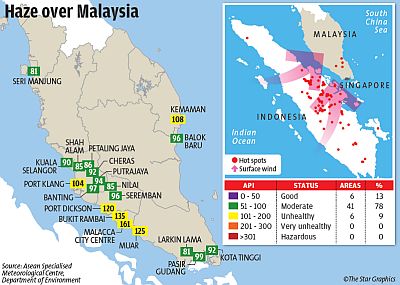Haze situation expected to worsen

(The Star) – The haze, which is affecting several parts of the country, is set to worsen with hotter and drier weather expected over the next few months.
The air quality in six towns in the peninsula dropped to unhealthy levels, based on the Air Pollutant Index (API), compared with just three on Saturday.
The Department of Environment (DOE) detected unhealthy API readings of 100 and above in Malacca (161), Bukit Rambai (135), Port Klang (104), Port Dickson (120), Muar (125) and Kemaman (108).
However, the quality of air at most other places in the country was between good and moderate.
Under the air quality index, readings of between 0 and 50 are classified as Good, 51 to 100 as Moderate, 101 to 200 as Unhealthy, 201 to 300 as Very Unhealthy and 300 and above as Hazardous.
In Malacca, the haze caused the API reading to increase from 68 to 161 over the past three days, the highest recorded in the country.
DOE director-general Datuk Halimah Hassan said the number of hot spots detected by the Asean Specialised Meteorological Centre in Sumatra, Indonesia, had increased from 46 on Friday to 101 on Saturday.
She attributed the haze to smoke from the hot spots in Sumatra being carried here by westerly monsoon winds, which began in early June.
“If the hot spots continue to increase and the direction of winds remains as it is, the situation could worsen,” she said.
She said the haze was a trans-border issue that required joint efforts by Malaysia, Brunei, Singapore, Thailand and Indonesia through the Ministerial Steering Committee on Transboundary Haze Pollution.
“The ministers are scheduled to meet in Kuala Lumpur sometime in August to discuss action plans to tackle the problem,” she said.
A Malaysian Meteorological Department spokesman said the westerly monsoon, forecast to last until September, was expected to bring drier and hotter days with occasional thunderstorms in the evenings.
The temperature is expected to rise to between 34°C and 36°C during the period with the urban areas feeling more of the heat because of buildings and the lack of surrounding greenery.
“During the hot and dry spell, people are advised to drink more water and avoid exposure to direct sunlight,” the spokesman said.
Health Minister Datuk Seri Dr S. Subramaniam advised Malaysians to avoid unnecessary outdoor activities.
“We are monitoring the situation and will issue appropriate advisories based on the air quality levels.
“For now, members of the public, especially those with respiratory problems, should keep away from prolonged outdoor activities,” he said.
Deputy Education Minister P. Kamalanathan said his ministry was monitoring the situation closely.
“We will make the appropriate announcement when deterioration of the air quality becomes a health risk to students,” he said.
Medical officer Dr Norlen Mohamed, who specialises in community medicine, said the effects of haze on health were associated with the severity of air quality status and health conditions of individuals.
She said possible health effects include irritation in the eyes, skin and throat, breathing difficulties, upper respiratory tract infections and even heart attacks.

